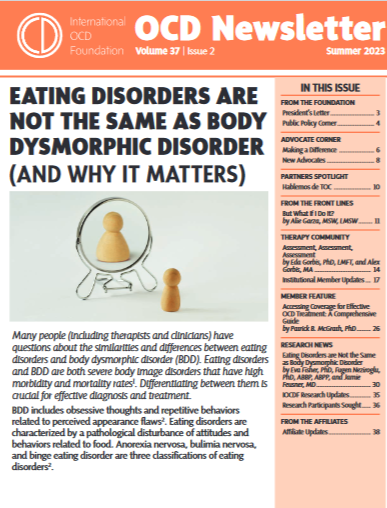Online Articles
Written by Dr. Jamie Feusner
Obsessive Thoughts About Your Appearance Bould be Body Dysmorphic Disorder—These are the Signs
Fortune Magazine
March 10, 2023
While eating disorders have been widely publicized for decades, far less attention has been given to a related condition called body dysmorphic disorder, or BDD. Read full article.
OCD Medications: An Introduction
TreatMyOCD.com
The idea of taking medications, especially if it’s your first time, can sometimes be anxiety inducing and bring about fears of... Read full article.




A Problem of Perception? What Research Tells Us About BDD
International OCD Foundation
Whenever Michael looked in the mirror, he saw nothing but baggy eyelids and dark circles under his eyes... Read full article.
The Neurobiology of Body Dysmorphic Disorder
International OCD Foundation
Body dysmorphic disorder (BDD) is a psychiatric illness in which people misperceive defects in their appearance, disrupting their ability to function... Read full article.




Medication Treatment for BDD: FAQ
International OCD Foundation
The category of medications called serotonin reuptake inhibitors (SRIs), also known as selective serotonin reuptake inhibitors (SSRIs)... Read full article.
OCD Medications: An Introduction
TreatMyOCD.com
The idea of taking medications, especially if it’s your first time, can sometimes be anxiety inducing and bring about fears of... Read full article.




Body dysmorphic disorder is more common than eating disorders like anorexia and bulimia, yet few people are aware of its dangers
The Conversation
March 9, 2023
Whereas people with eating disorders might view their underweight body as too fat, those with body dysmorphic disorder see themselves as ugly or disfigured even though they appear normal or attractive to others.. Read full article.




Eating Disorders Are Not the Same as Body Dysmorphic Disorder (and Why It Matters)
International OCD Foundation
Summer 2023
“Functional magnetic resonance imaging(fMRI) experiments that directly compared and contrasted body dysmorphic disorder
and anorexia suggest they may have similar, although not identical, abnormal visual system processing.” Read full article.
